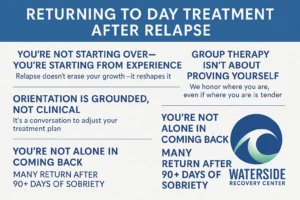You didn’t think you’d be here again.
Maybe it happened gradually—missing one group, then two. Or maybe it happened all at once, a decision you can’t quite explain. However it unfolded, you’re back at the place where healing started once before. And this time, the weight feels different.
Not because you’re starting over. But because you’re carrying something heavier than last time: shame.
Let’s pause there.
Shame says, “You messed it up.”
Recovery says, “You’re still allowed back.”
If you’re considering re-entering a day treatment program, especially after 90 days or more of sobriety, you’re not alone—and you’re not disqualified.
This isn’t a punishment. It’s a return.
Here’s what your first day back might actually feel like.
You’re Not Starting Over—You’re Starting From Experience
Many alumni fear they’ll be treated like they’re back at square one. That all the progress, insight, and growth they once earned will be wiped away by one relapse.
Let’s be clear: it won’t be.
At Waterside Recovery, we see relapse as a chapter, not the whole book. You’re returning with a clearer view of what recovery asks of you. What tripped you up. What still hurts. And maybe, what matters most to you now.
Relapse doesn’t erase your growth—it reshapes it.
Orientation is Grounded, Not Clinical
Even if you’ve been through intake before, you’ll have a one-on-one check-in with a clinician or intake staff member. This isn’t a grilling. It’s a conversation.
We might ask:
- What has life looked like lately?
- What brought you back now?
- What felt strong in your last experience—and what didn’t?
This is about adjusting your treatment plan to meet who you are today. Not who you were three months ago. Or six. Or at your lowest point.
You’re a living, changing human being. Your care should reflect that.
Group Therapy Isn’t About Proving Yourself
Worried about walking back into group after a relapse? You’re not the only one.
Many alumni describe it like walking into a room full of people you don’t want to disappoint. But more often than not, what they actually find is nods of understanding. A few quiet “I’ve been there” glances. And eventually, someone will say what you’ve been afraid to:
“I thought I couldn’t come back either. But I’m so glad I did.”
You’re not required to unpack everything on day one. You won’t be asked to justify your relapse. In fact, you’ll set the pace of what you share—and when.
We honor where you are. Even if where you are is tender.
The Curriculum Will Hit Differently—And That’s a Good Thing
You might recognize parts of the day treatment curriculum. The structure may feel familiar—psychoeducation in the morning, skills-building in the afternoon, optional therapy or groups in between.
But here’s the thing: You’re not the same person hearing it.
This time around, certain topics may land with a new kind of clarity:
- Maybe you understand boundaries now not just as a skill—but as survival.
- Maybe you finally see the connection between stress and slipping.
- Maybe you’re ready to look at trauma in a way you couldn’t last time.
Repeating the work isn’t failure. It’s reinforcement. You’re building new muscle where old wounds tried to grow back.
You’re Not Alone in Coming Back
Relapse is more common than you think. And so is coming back.
In fact, many of the most grounded alumni—the ones who go on to live stable, sober lives—have had at least one return to care along the way. Not because they didn’t “get it,” but because recovery isn’t linear.
Coming back is brave. Quietly, profoundly brave.
Here’s what one former client said:
“I thought they’d be disappointed in me. But instead, they said, ‘We’re proud of you for coming back.’ I didn’t expect that kind of grace.”
– Alumni, 2023
Grace is not weakness. It’s strength with open arms. And it’s part of what makes Waterside different.
You’ll Have Options—Because Recovery Isn’t One-Size-Fits-All
Your treatment plan can flex with your current needs. If you need more support this time around, we may recommend additional therapy, medication management, or trauma-specific services. If you need more flexibility, we’ll work with you on scheduling.
Waterside’s day treatment program in Plymouth County serves people with layered, real lives. Jobs. Kids. Guilt. Dreams. We treat the whole person, not just the symptoms.
Your relapse doesn’t cancel your future. It helps us understand what kind of future will feel safe, sustainable, and real.
Expect to Feel—And That’s Okay
Day one might come with a mix of emotions:
- Guilt
- Anxiety
- Relief
- Embarrassment
- Hope
All of it belongs. We won’t ask you to fake positivity. We will invite you to be honest. And we’ll meet you there—with calm, clinical care, and a space that’s designed for re-entry, not rejection.
Looking for Day Treatment Program Support in Bristol County?
While Waterside Recovery is based in Plymouth County, MA, we also serve clients from surrounding areas, including those looking for a day treatment program in Bristol County, MA. If returning to care feels right but geography feels like a barrier—call us. We’re here to help you find your fit, whether that’s with us or a partner nearby.
FAQs: Returning to Day Treatment After Relapse
Will people in the group know I relapsed?
Only if you choose to share it. Group therapy is a space for honesty, but the pace and depth of what you reveal is always your choice.
What if I’m embarrassed to come back?
That’s completely normal. Many returning clients feel embarrassed at first—but they also describe feeling deeply relieved once they walk back in the door. You’re not alone, and you won’t be shamed.
Is there a waitlist to return?
It depends on the time of year and program capacity. However, alumni often get priority access when possible. Calling sooner increases your chances of a quicker re-entry.
Will my treatment plan be the same as before?
Not necessarily. We’ll revisit your goals, what’s changed, and how your needs have evolved. Your new plan will reflect who you are now—not who you were three months ago.
What if I left on bad terms?
You’re still welcome to reach out. We understand that people leave treatment for all kinds of reasons. Returning takes courage, and we honor that more than the circumstances of your departure.
The Door Never Closed
If you’re reading this, you’re already doing something powerful: considering a return. That alone means hope is still alive in you, even if it’s quiet.
You haven’t failed. You’ve just hit a moment that calls for more support—not less.
Ready to return to care?
Call (866)671-8620 or visit Day Treatment Program in Plymouth County, MA to learn more.
We’re here. Still. Always.



